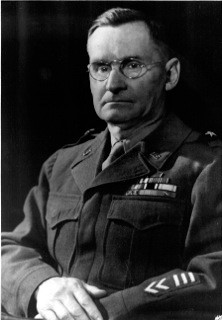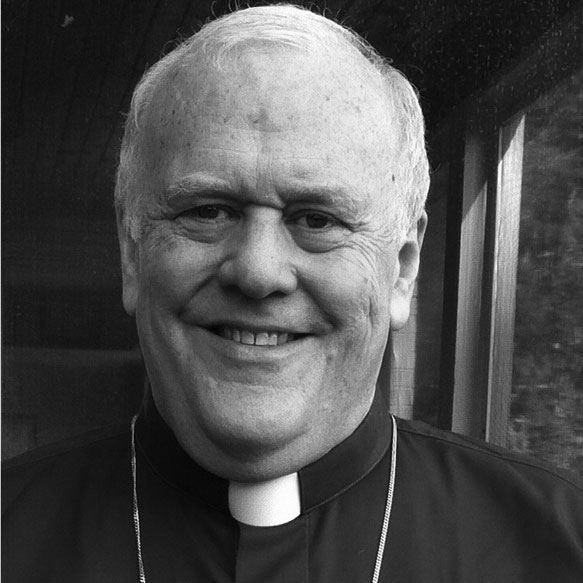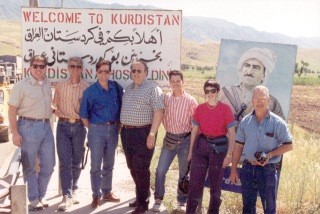
For “official” military photos, one is not allowed to smile. That must have been difficult for my grandfather. Shortly after I was born, “war” broke out in Korea. My father was shipped over to the “police action” in Korea as an infantry officer. It hadn’t been long since my father spent years in the jungles of the Philippines in World War II. An adult male influence in my life would have been missing had it not been for my Grandfather. He had just retired from a long career in the Army and so I spent time with him every day. I still remember his crooked smile, the way he would wave with two fingers, and the many pithy sayings he offered. Somehow, my daughter found this picture of him and got it printed and framed for me for my birthday this year. It certainly is brining back loads of memories.
I’ve mentioned how he used to carry me around and whisper the motto from West Point from which he graduated in 1916. After graduating he raced overseas for WW I, where he served at Château-Thierry. Because of the limited range of weaponry back then, his Horse Artillery assignment put him in the thick of the battle.
“Duty, Honor, Country,” he would whisper so quietly even a person standing beside us would never hear, but I heard it and it settled into my spirit and soul. To this day, I am moved by schmaltzy small-town Fourth of July parades with American Flags on fire trucks. He was a father figure for me for the five years my Father was away. The “toddler speak” name I assigned to him was “Daddy Pick.”
Periodically, when something would break or someone would make a big mistake that impacted others he would sigh and say, “Address your painful problem today or address a worse problem tomorrow.” Then he would address the problem and usually fix it. When other people would fail to address a problem and it mushroomed out of control, he would say, “See. The painful problem became a worse problem.”
“There are three ways to learn something,” he would say. “Precept, Example, and horrible example!” Obviously, precept (where you figure it out before the crisis crashes down on you) is best. Horrible example is worst because it is, well… horrible!
There is something beating in most human hearts that longs for significance, longs for love and intimacy, and longs for freedom. I say most, because some hearts are so twisted or so wounded that they try to find their place not from the cultivation of the fruit of the spirit, but from the pursuit of the world and the flesh. The pursuit of Jesus Christ and Biblical faith is the fruit of the Holy Spirit. That is love, joy, peace, longsuffering, kindness, goodness, faithfulness, gentleness, and self-control (Gal 5:22-3). Under the influence of the evil one, instead of pursuing God the Father, the Lord Jesus Christ, and the Person of the Holy Spirit, the dark journey pursues the world, the flesh, and ultimately, the devil. It is a dark descent into a chasm of terrible evil. We are seeing that manifest around the world today in staggering proportions.
The places where the Gospel has prevailed as the focus of social order are not perfect (they have people in them!), but they also have an abundance of Gospel fruit. Stability, peace, education, prosperity, families, philanthropy, and generosity tend to increase when people follow Christian teaching. Where there are gaps in the teaching and relationship with Christ, there will also be gaps in the fruitfulness of the society. Where the principles of Christian living are deeply engrained in the culture, there is more fruit. Though liberal revisionists try to deny it (sometimes with elaborate deceptions about the founding of the US), it is Biblical faith and Judeo-Christian fidelity that shaped the foundations of the United States.
One of the mistakes of foreign policy that the US has made has been thinking that it was obvious that everyone longs to be free and is ready for democracy. While that may be true for most, there are two things that also need to be said. First, a culture cannot move past multiple paradigms into democracy in one step. Coming from feudalism or despotism, there are steps that need to be taken, and they cannot be skipped.
This is not only true for political organization, it is also true for many other areas of life and culture. For example, when a culture has been living with a nomadic herdsman or subsistence farming model, it is not possible to have them jump to internet banking. One has first to introduce the concept of cash, and then have people develop through a cash society. Then a banking society economic model. After banking, comes credit and “plastic” tools for economics. Ultimately, internet banking and a truly “cashless society” can emerge. Of course if that is not managed well, then there is a bubble that bursts and, worst case, the culture goes back to a barter economy!
The same thing happens politically. To move from a patriarchal (or matriarchal) society, other models have to be introduced. Instead of having extremely disbursed social structure on familial lines, central authorities have to be established. These authorities can be feudal, monarchial, or despotic. When a culture has lived with little or no freedom, it is a tremendous adjustment for people to manage the new-found freedom. Many will find the transition all but overwhelming and will be stuck in place waiting for someone to tell them what to do when faced with a choice that is outside their experience base. The skills and tools of decision-making need to be learned and developed.
Over the last several weeks, I’ve been talking about the terrible situation in the Middle East. From early US Air Force days in the 1970’s when I used to travel through the Middle East flying embassy mail runs and support, through ministry trips more than twenty years ago, I’ve watched a lot happen. Some successful mission opportunities have planted some seeds of entrepreneurialism. In the 90’s I traveled through Kurdistan and taught about underground church planting using home cell groups for evangelism, since free standing-churches were almost impossible to build. Here is a group I traveled with in the 90’s teaching cell group evangelism while they pursued water well drilling. This is the same area where ISIS is today wrecking such havoc.
When US troops pulled out of Iraq, things were pretty stable at first, but there were several underlying fissures that made it difficult for that stability to be lasting. First, the people lived for generations under despotic control. There were some cosmopolitan people in the cities, but in the rural areas there were three constants: Herding/farming, Islam (either Shia or Sunni depending on the area), and despotic control from a pretty much feudal war lord. Whoever had the most fire-power was the local decision maker. Whoever cobbled together the most military weaponry was in charge. Decisions from Sadaam were far off and few between, though often sweeping, including such things as conscription and taxes.
The failure of Western leaders to understand the Shia-Sunni divide has led to disastrous consequences. It is very difficult for Westerners to understand the Sunni-Shia divide. Never one to shrink from a challenge, I’ll share some points about that. The reason we need to learn about it is simple. If we don’t address our painful problem now, we’ll have to address a more painful one tomorrow. History in dealing with Islam has proven this point over, and over, and over, and over, and over ad nauseam.
All Muslims believe what are called the five pillars of Islam. They are:
Sawm -Fast during Ramadan
Hajj -Pilgrimage to Mecca
The Shahadah -Pledge the faith
Salat -Practice Ritual Prayer
Zakat -Give charity to the poor.
Fasting during Ramadan is refraining from eating from Sunrise to Sundown. During Ramadan, Muslim cultures have “tickers” scrolling across the bottom of TV screens to show when Sundown is. People will be lined up outside restaurants in large number when the declaration is made that it’s Sundown and [essentially] “time to party.”
The Hajj is a pilgrimage to Mecca that Muslims date back to the time of Abraham, but it was certainly advanced during Mohammed’s time. It is considered the religious duty of every adult Muslim who is physically and financially deemed able to fulfill the Hajj. They are called istita’ah. One who fulfills the visit is called a mustati. The Hajj includes many acts of prayer, ceremonial walking around the Ka’aba (a building in the shape of a cube), and drinks from the Zamzam Well (where Abraham’s son Ishmael received water miraculously from God). There are also many other rituals involved.
The Shahadahmis basically a testimony. In its short form it is the familiar statement “There is no God but Allah, and Mohammed is the Messenger of Allah.” This is basically the call to prayer which is heard over loudspeakers from Mosques. The call to prayer expands it to repeat things about the “greatness of Allah” and a call to prayer, which is also called a “call to success.”
Zakat is the giving of charity to the poor. In practice, it is actually often just giving to the Mosque. It is through this principle that a great deal of funding for groups that Westerners find suspect occurs.
Sadly, agreement on those “Five Pillars of Islam” is not enough to keep Sunnis and Shia together. Where the two groups diverge is on the succession of leadership following Mohammed’s death. Shia, which is the short form of Shīʻatu ʻAlī, are those who believe that the succession passed through Ali, Mohammad’s son-in-law. The leader of Islam is called the Caliph. Ali, therefor is the first Imam. The anointing can even extend to the point of infallibility, and can address social and political issues in addition to religious ones. There is widespread (though not ubiquitous) belief that the Twelfth Imam, Muhammad ibn Hasan al-Mahdī will return as the savior who will establish peace and justice. He will come with Isa (the Arabic name for Jesus), but it is the al-Mahdī (12th Imam) who will reign to provide peace, not Jesus.
The Sunni Muslims believe that the succession went to and through Abu Bakar who became the first Sunni Caliph instead of Ali whom they reject. It is critically important to understand that Sunni’s believe that as culture evolves Islamic law and rulings must evolve as well.
About a third of Muslims are Shia. The Shia lean toward favoring a return to 7th century social structure and Islamic practice. That is problematic for the world.
Before the defeat of Saddam Hussein, the Sunni Muslims controlled Iraq even though they did not represent the majority of Muslims that live in Iraq. When Saddam fell, Shias came into power. Al Malaki became the leader in 2006. He allowed, or even fostered, retribution by Shias towards Sunnis. In the military, the Shia generals who had been highly trained by the US forces were fired and replaced with political hacks, appointed by Al Maliki. The result was a headless organism. When conflict rose from the radical Sunni ISIS, the generals who had been put in place through nepotism fled and left the forces without leadership. Reports are that as few as 400 ISIS troops overran Mosul which had forces of something like 10,000 troops under arms. There was a command and control problem. There was no command, so the Iraqi Army had no one controlling it. After the 400 were in place and were visibly controlling Mosul, thousands of new recruits and reinforcements from Syria came flooding in. ISIS control is unspeakably brutal. People were unwilling to resist because they did not want to be killed and have their families tortured.
To make matters even more complex, the ISIS terrorists reject most of the Shia as being heretics because of their position on succession. It’s odd that they don’t resonate with the more “fixed” view of Islam from the Shia. At the same time, ISIS views many Sunnis with suspicion. Pretty much, they march to their own violent drum beat.
Had the plans for democratization of Iraq included work to have the two sects be functionally reconciled and cooperate, there could have been a very different story. After the fall of Saddam was the perfect opportunity to introduce the principles that gave rise to English, European, and American strength. That, of course, was the Gospel. Sadly, there was never a strategy to share what could make chaotic Iraq stabilize. Add in some very high profile examples of poor moral leadership among Allied troops in Iraq, stir in terrible cultural forces in the West like pornography, greed, and MTV, and the outlook was not rosy.
It has been said that the US forces had to leave because the White House was unable to negotiate a “Status of Forces” agreement with Al Maliki. In fact, there was no will from the Obama White House to press for one, seeing the return of troops from Iraq to the US as a political victory. Had the US absolutely insisted, troops could have stayed and could have worked for social order that fostered Sunnis and Shia working together. Sadly, there was no will to engage that effort nor the appreciation of how important it was. It was simply viewed by the “bird-in-the-hand” US politicians as expedient to get the troops home. Now, failing to deal with the painful problem has paved the way for a worse problem to emerge. This one is not one discerned by precept or example. It is a HORRIBLE EXAMPLE and will be exported. Over the weekend, social media sites were posting new threats of ISIS members who say they are heading toward the now intentionally non-existent border between the US and Mexico. While the overwhelming majority of the people are motivated by seeking better financial and social circumstances, with millions and millions of people being indiscriminately welcomed into the US, without a doubt there are some very, very bad people among the millions.
There are only two ways to deal successfully with the radicals. Either overwhelming military subjugation, or conversion to Christ. Western Christians (for Europe is in the same mess) need to understand that. Sadly, it would be a big surprise if conversion alone will work as a strategy. It may well be that extensive military force will be necessary to stem the tide of violent subjugation until the Church can get its act together to share the Gospel in meaningful ways.
The great challenge is that we must not just “do something!” We must do what is right. Dietrich Bonhoeffer found that he came to the place as a Christian disciple where intervention by force was the only justifiable course for him. Like it or not, we may soon face similar choices in what has been for many, a very comfortable experience of faith up to this point. The failure to do what is right has led this crisis to develop. Of course, not everyone did bad things. Just not enough did good things. Certainly, not enough senior leaders properly diagnosed the situation. Engaging it now is smarter than waiting.
People may be getting tired of hearing about this kind of thing. Too bad. More is coming. Some in precepts from me. Some in horrible examples from ISIS.
Bill Atwood is Bishop of the International Diocese of the Anglican Church in North America and a contributing author for the American Anglican Council.



